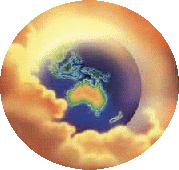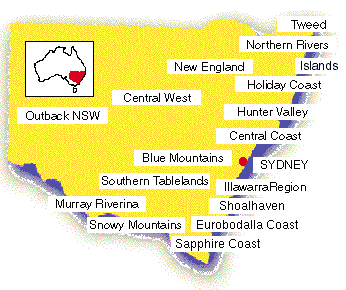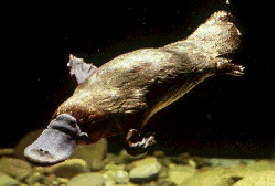
State title-New South Wales - The Premier State
State animal
The platypus (ornithorhynchus anatinus)
The State bird of New South Wales
is the ‘laughing’ kookaburra (dacelo novaequineae). The raucous peals of the kookaburra, one of Australia’s best known birds, are heard at their strongest in the early morning and at sunset. Kookaburras, members of the Kingfisher family, inhabit wooded territory in eastern Australia and southern parts of South Australia and Western Australia.
State flower
The Waratah (telopea speciosissima)
Population and geographic area
The State of New South Wales has a population of approximately 6.2 million people with around 3.8 million living in Sydney’s 12,400 square kilometre area. Along Sydney’s western border lie the Blue Mountains, to the east is the South Pacific Ocean, to the north and south are national parklands.
New South Wales covers an area of 810,600 square kilometres - about 10 percent of the Australian continent. This is roughly the same area as California. The State is highly urbanised, with over 73.5 per cent of the population living in cities or towns of 20,000 people or more. Around 60 per cent of the total live in Sydney.
As diverse as it is beautiful, New South Wales offers every type of geographical feature available in Australia, from snow-capped Mount Kosciuszko (2,228 metres) in the south, to the sub-tropical beaches and rainforests of the north coast; and from bush landscapes of the coastal zones and rugged tablelands to the arid far west plains.
Climate
Sydney and most of New South Wales has a warm and temperate climate with sunshine most days of the year. Much of the State is free from extremes of heat and cold, the exceptions being the soaring summer temperatures experienced in north-west towns such as Bourke, and the below freezing temperatures in the Kosciuszko skifields.
The coast can be humid; the tablelands are cool in the north and cold in the south; the western slopes are drier and warmer; and the western plains are very dry and hot.
Average temperatures
Spring September to November 17°C (63°F)
Summer December to February 22°C (72°F)
Autumn March to May 18°C (64°F)
Winter June to August 13°C (55°F)
Time differential (from Greenwich Mean Time)
New South Wales summer daylight saving time – plus 10 hours
New South Wales winter time – plus 9 hours
New South Wales Government
New South Wales is part of a Federation of six States and two Territories which form the Commonwealth of Australia. The State Government, like that of the Federal Government, is based on the British Westminster system.
The New South Wales legislature consists of the Governor, and the Legislative Assembly and Legislative Council, which together exercise the legislative functions of government. General elections of the Legislative Assembly and Legislative Council are held every four years.New South Wales Parliament is located in Macquarie Street, Sydney.
Sydney City Council
The Council presides over an area of six square kilometres which generates the largest council income in Australia: Rates total around A$80 million. The Council consists of seven councillors, including the Lord Mayor, and 758 City Council employees.
Natural resources
Coal accounts for approximately 72 per cent of the value of minerals produced in the State, and silver, lead and zinc provide approximately 13 per cent of the value of New South Wales’ mineral production. This represents 18 per cent of Gross Domestic Product to the Australian total for the mining sector.
New South Wales has deposits of sandstone, trachyte, granite, basalt and marble; opals and sapphires are also mined.
Main timber resources are eucalypt, softwoods and pinewoods from plantations. Eden on the South Coast is the centre of the woodchip export industry.
The six primary sources of energy in New South Wales are oil, natural gas, coal, water for hydro electricity production, bagasse (a burnable waste product of the sugar industry) and wood.
Manufacturing
About one-third of Australian manufacturing activities take place in New South Wales. The largest industry sub-divisions are food, beverages and tobacco, basic metal products, other machinery and equipment, chemical, petroleum and coal products, and paper, paper products, printing and publishing.
Tourism
Tourism injects an estimated $20 billion into the New South Wales economy every year, and in the lead-up to the 2000 Olympics and beyond tourism will continue to develop as the State’s fastest growing industry.
Trade
New South Wales accounts for nearly half of the country’s imports and one quarter of the exports. Principal exports are coal, coke and briquettes, sheep or lambswool, and aluminium. Major imports are computers, road vehicles, and electrical equipment.
Sydney’s sister cities
Guangzhou, China;
Nagoya, Japan;
Portsmouth, United Kingdom;
San Francisco, USA;
Wellington, New Zealand.
Flight times to Sydney
International
Bangkok 10 hours 25 minutes
London 23 hours 25 minutes
Los Angeles 13 hours 30 minutes
Manila 7 hours 45 minutes
New York 21 hours 30 minutes
Paris 24 hours 15 minutes
Singapore 7 hours 55 minutes
Tokyo 8 hours 15 minutes
Vancouver 16 hours 10 minutes
Domestic
Adelaide 1 hour 55 minutes
Alice Springs 2 hours 55 minutes
Brisbane 1 hour 15 minutes
Canberra 40 minutes
Darwin 5 hours 25 minutes
Hobart 1 hour 45 minutes
Melbourne 1 hour 15 minutes
Perth 4 hours 15 minutes
Banking/business hours
Banks are generally open 9.30am-4pm Monday-Thursday; 9.30am-5pm Friday. General office hours are 9am-5pm, Monday-Friday. Post offices are open 9am-5pm Monday-Friday.
Sydney City information
Detailed information on current city events, attractions, performances, restaurants, etc. is available in a variety of city magazines and daily newspapers.
Currency
Australian currency is decimal with the dollar as the basic unit (100 cents equals one dollar). Notes come in $100, $50, $20, $10, $5 denominations. Coins come in 5c, 10c, 20c, 50c, $1, $2 denominations.
Currency exchange and cashing travellers cheques can be made at Sydney International Airport as well as at banks and large hotels. Banks will accept most travellers cheques in every currency. Most widely accepted are American Express, Thomas Cook, Visa, Barclays, Bank of America and Mastercard. ATM (Automatic Teller Machine) cards canbe used as long as they have been converted for international access. Travellers should contact their bank at home for information of availability and service charges.
Driving licences
A bona-fide tourist may drive in Australia on a valid overseas driver’s licence for the same class of vehicle. Licences must be carried when driving, in addition to a valid passport. If the driver’s licence is not in the English language, the visitor must carry a translation with the permit. In some states visitors should present their licence to the motor registration authority on arrival.
An International Drivers Permit is not sufficient by itself and must be accompanied by a valid driver’s licence.
Emergency
For emergency calls to ambulance, fire or police, dial 000.
Food and restaurants
You can dine at elegant restaurants, leading hotels and other locations or enjoy a "pub" counter lunch. Bistros, cafes and family-style restaurants offer good food at reasonable prices. There are many low-cost eating places, including fast-food chains.
Food is fresh and plentiful at stores and supermarkets. Australian wines are good and inexpensive; beer is served chilled. Many restaurants have a full liquor service; others allow you to "bring your own" (BYO) wine or beer to serve with your meal. Though some charge a ‘corkage fee’ for this service.
Health
You will encounter few health hazards when travelling in New South Wales. Standards of hygiene are high, particularly in food preparation. Doctors and dentists are highly trained and hospitals are well equipped. Overseas visitors are strongly recommended to take out health insurance before departure to cover the duration of their stay.
It makes sense to follow the same simple health and safety rules you observe at home. Just as you should protect yourself from exposure to the Australian sun, when partying and having fun you should protect yourself from other risks such as exposure to HIV and other sexually transmitted diseases.
Visitors who are covered by Australia’s national health insurance scheme, Medicare, are those who are residents of one of the seven countries with which Australia has reciprocal health-care agreements - the United Kingdom, New Zealand, Italy, Malta, Finland, Netherlands and Sweden. The agreements provide health care for immediately necessary medical treatment only.
Liquor laws
General licensing hours for public bars are Monday to Saturday 10am to 10pm. Sunday hours vary. Restaurants, clubs and hotel lounges have more flexible hours. You must be 18 years or older to buy or consume alcohol in public. Packaged alcoholic beverages are sold at hotels, liquor stores and other licensed premises.
Medications
Visitors are permitted to bring reasonable quantities of prescribed (non-narcotic) medications. All should be clearly labelled and identifiable. For large quantities it is advisable to bring a doctor’s certificate to produce for Customs if necessary, and to an Australian doctor if required. Local pharmacies, called chemists, can fill most prescriptions (which must be written by an Australian-registered doctor).
Outback Travel
Take precautions when travelling independently in Outback New South Wales. Plan your trip with the aid of a reputable map, stay on recognised routes and check facilities and road conditions before departure. Make sure you carry ample supplies of petrol and water. In the case of a breakdown, stay with your vehicle where there is shade and protection from the heat.
Petrol/Gas
Petrol comes in leaded and unleaded grades and is sold by the litre. Petrol costs between $A0.66-$A0.80 per litre.
Prices are often higher in country areas. Petrol stations are plentiful; trading hours vary. Most accept international credit cards.
Quarantine
Australia is free from many pests and diseases which can damage agriculture and the environment. To keep it that way, the importation of fresh or packaged food, fruit, eggs and egg products, vegetables, seeds, cultures, animals, plants and plant products is strictly controlled.
Religion
Christianity is the predominant faith but all major religions are represented. Your hotel desk can advise you on places of worship.
Shopping
Take your pick from shopping arcades, department stores, duty free outlets, designer boutiques and vibrant markets. Good buys include Australian opals and other precious or semiprecious stones, sheepskins and leather goods, Aboriginal artefacts and paintings.
Duty free shops are located in the city centre and Sydney Airport. Shops attached to galleries, museums and many other tourist attractions are stocked with an excellent range of interesting souvenirs.
Study, Stay and Play
Universities and colleges have pulled out all stops to attract overseas students to Australia. Our tertiary institutions pride themselves on being among the best in the world and graduates from Australia have achieved international reputations in a diverse range of fields including business, the arts, politics, science and teaching.
Because of Australia’s multicultural roots, the student make-up of tertiary institutions is also ethnically diverse. In 1997, at the University of Technology, Sydney (UTS), for example, 33 percent of the 24,378 locally enrolled students come from a non-English speaking background, their families having migrated to Australia.
Universities which accept international student enrolments do so on the basis of each student’s English-language skills and the parity of their overseas educational qualifications with the normal tertiary entry requirements in Australia.
To enrol at an Australian university, an international student will need at least A$12,000 each year in addition to tuition fees to pay for health cover, books, accommodation, clothing, food and public transport. International students on student visas are entitled to work in part-time jobs for up to 20 hours a week.
Apart from the mainstream universities and colleges, courses run by privately owned colleges and the Technical and Further Education (TAFE) colleges are also available. For students who plan to undertake privately run courses, ask as many questions as possible and make sure that the college gives full information.
In particular, ask about the college’s accreditation with Australian Government education authorities.
It is not possible to come to Australia on a tourist visa and begin studying. An application for a student visa must be made in person to an overseas Australian Education Centre or to an Australian diplomatic mission.
For more information, write to the head office of IDP Education Australia at GPO Box 2006, Canberra, ACT, 2601, Australia. Tel: 61-6-285 8222; Fax 61-6-285 3036. IDP also offers educational services in Bangkok, Hong Kong, Jakarta, Kuala Lumpur, Manila, Seoul, Singapore, Taipei, Bangladesh, Cambodia, China, India, Mauritius, South Africa, Vietnam, Sri Lanka and Hungary.
Sun protection
Enjoy outdoor activities such as sightseeing, bushwalking, boating and camping without the risk of harmful exposure to the sun by using simple skin protection. Wear a shady hat, a shirt with a collar and sleeves, and SPF 15+ broad-spectrum, water resistant sun screen. Try to avoid the sun during the middle of the day, between 10am and 2pm (11am and 3pm in daylight saving time) when the ultraviolet rays are at their strongest.
Surf Safety
Always swim at beaches patrolled by lifesavers or lifeguards. You should only swim between the red and yellow flags. They mark the safest place to swim, and the area where lifesavers patrol. Most beaches are patrolled from October to April.
Taxis
Meter operated taxicabs service all major cities and towns. You will find taxi ranks at transport terminals, major hotels or shopping centres or you can hail them in the street. The Yellow Pages of the telephone directory list taxi companies who will send a radio controlled cab to pick you up (for a small charge). There is a minimum "flagfall" charge, then a charge for the distance travelled. Small additional charges are made for luggage and telephone bookings, otherwise the account shows on the meter. Taxi drivers do not expect to be tipped, but happily accept gratuities.
Tipping
Tipping is not the general custom in Australia and service charges are not added to accounts by hotels and restaurants. Porters at airports, taxi drivers and hairdressers do not expect to be tipped although you may do so if you wish.
At railway terminals porters have set charges, but not at hotels. In better class restaurants it is usual to tip food and drink waiters up to 10 per cent of the bill for good service. At any time tippingis your choice.
Tourist information centres
Even in the smallest town in New South Wales you will find an outlet distributing local tourist information and advice free of charge. Look for the international “i” sign.
Vaccinations
Vaccinations are not required if you are travelling direct unless you have come from or visited a yellow fever infected country or zone within six days prior to arrival. You do not need any other health certificate to enter Australia.
Visitors with disabilities
Australia is very aware of the need for facilities for people with a disability.
Advance notice and details of your disability will ensure the best possible assistance from airlines, hotels or transport offices. Many cinemas and restaurants are happy to assist although not all can cater for people with severe disabilities or wheelchairs. Most newly built buildings provide wheelchair access.
Weights and measures
Australia uses the metric system of weights and measures. Speed and distance are measured in kilometres; goods in kilograms and litres; temperature in Celsius (Centigrade).
"Click to go back"
Back New South Wales
 New South Wales was the first state settled in Australia.
Sydney is the capital city and it also has the largest population of any of Australia's capital cities. Over three million people live in and around Sydney.
The facts about -New South Wales
New South Wales was the first state settled in Australia.
Sydney is the capital city and it also has the largest population of any of Australia's capital cities. Over three million people live in and around Sydney.
The facts about -New South Wales

is the State’s animal emblem. It is duck-billed with webbed feet. Like the echidna, the platypus lays eggs yet is warm-blooded and suckles its young. An agile little animal about 500mm (20 inches) long, the platypus lives on insects, shrimps and crayfish in freshwater creeks and rivers in eastern Australia.

is the State’s floral emblem. The brilliant red flower of this tall, majestic shrub is made up of many individual blooms. Found only in New South Wales, the Waratah blooms in spring.